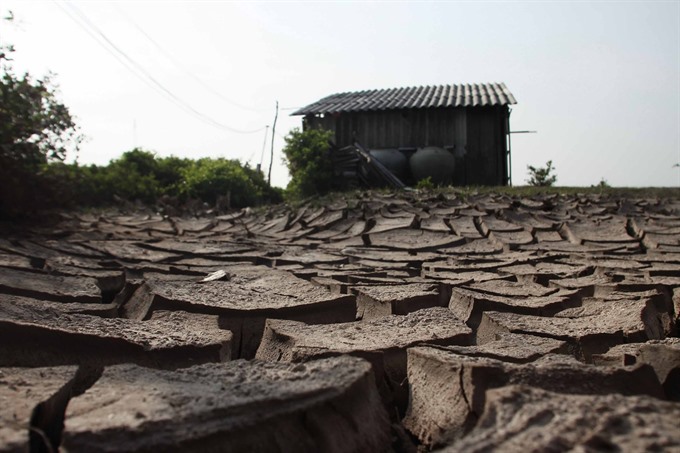 Environment
Environment

The Ministry of Natural Resources and Environment has asked 38 cities and provinces nationwide to promptly revise the operation of reservoirs to ensure water sources for low-lying areas in this dry season, especially in vulnerable areas such as the central region, the Central Highlands and the Mekong Delta region already hit by drought last year.
 |
| Cracked soil in Tân Thành Commune in Gò Công Đông District of the northern province of Tiền Giang. Cities and provinces, particularly in drought-struck areas, are asked to promptly revise the operation of reservoirs to ensure water for low-lying areas in this dry season. — VNA/VNS Photo Tuấn Anh |
HÀ NỘI – The Ministry of Natural Resources and Environment has asked 38 cities and provinces nationwide to promptly revise the operation of reservoirs to ensure water sources for low-lying areas in this dry season, especially in vulnerable areas such as the central region, the Central Highlands and the Mekong Delta region already hit by drought last year.
In the document sent to each locality, the ministry directed local people’s committees to oversee relevant authorities as they examine the demand for water in low-lying areas. They were also asked to watch the changes of weather and water flows so that water is discharged from the reservoirs according to need.
Currently, 67 reservoirs and dams are under the Government’s reservoir operation regulations for 11 rivers nationwide.
The head of the ministry’s Department of Water Source Management, Hoàng Văn Bảy, said the regulations had helped provide reservoir water for lowland areas in the dry season and prevented floods caused by improper water discharges.
In the previous dry season, thanks to the compliance with the regulations, 65.3 billions of cubic metres of water were discharged to lowland areas nationwide.
In the central region and Central Highlands alone, the two hardest-hit areas of the historic drought caused by the El Nino phenomenon, about 17.4 billion cubic metres of water were discharged to meet the urgent water demand for daily use and production activities.
However, Bảy said, the amount of water only solved drought in certain low lying areas due to lax management and coordination among ministries, sectors and localities. As regulated, reservoir owners must set up plans for discharging water and report to the local authority and the ministry in order to get final approval and ensure that the plan does not contradict plans of other areas. However, not every owner asked for the local authority’s permission, leading to ineffective drought prevention nationwide.
Bảy said that in order to solve the problem, the department has set up inspection teams to directly supervise the operation of reservoirs. Units in charge of managing reservoirs were required to supply information and data on the reservoirs on their websites for better management. - VNS




